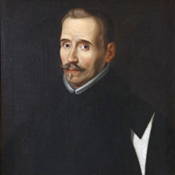
public domain
Lope de Vega
Playwright
Biography
Lope de Vega
Lope Félix de Vega Carpio is one of the foundational poets and playwrights of the Spanish Golden Age. He was one of the most prolific writers of the era (writing thousands of individual works), and was even nicknamed the "Monster of Nature" by Cervantes. He is famous for being a heady combination of a rogue and a womanizer, a loving father and a devout priest, an inquisitor, and a novelist/playwright/poet.
He began writing at a young age and, when he was fifteen, he left school and entered the University of Alcalá de Henares to study. He then continued his studies in Mathematics and Astrology with Juan Bautista Labaña, Phillip II's chief cosmographer, and liberal arts with Juan de Córdoba. In 1583 Lope enlisted in the Spanish Navy and his life then took a frenetic turn. Scandalous love affairs, a jail term for libel, eight year banishment from court, and two years in exile came one after the other. Further love affairs and scandals continued, as did his literary output. However, in 1614, Lope joined the priesthood following the death of his favorite son and his wife. Although his romantic dalliances continued, Lopes experienced an existential crisis and his works took on a more profound, devout tone. Finally, in 1635, Lopes once more experienced the death of a favored son and his youngest daughter was abducted. Lope died of scarlet fever in the August of the same year.
By the time of his death he had written about 500 plays (as well as many sonnets, three novels, four novellas, and nine epic poems). Importantly, in his material, he established a structure for Spanish theatre, developing the three act comedia (plays combining drama and comedy), as well as source material for construction of the dramatic conflicts.
Shows
Shows associated with Lope de Vega
Monologues
Monologues from shows associated with Lope de Vega
Scenes
Scenes from shows associated with Lope de Vega
Quizzes
Quizzes associated with Lope de Vega
Learning Modules
Learning modules associated with Lope de Vega
Additional Information
N/A